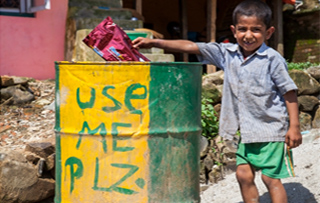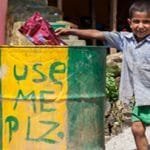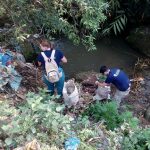
Waste management is a critical concern in Nepal, and can have profound implications for public health. Many cities in Nepal are covered in piles of plastic and organic wastes. Municipalities are solely in charge of the collection, transportation, treatment and dumping of solid waste. However, many are not well equipped for the safe disposal of waste products. With limited rubbish removal facilities, and absence of significant recycling industry, waste is often dumped on roads and in rivers. The waste collected is is deposited at crude dumping sites, where it is left untreated regardless of the public health risk it presents. Nepal’s ability to cope with solid waste is inadequate. Hazardous practices such as burning is still wide spread. The public is unaware or ignorant about the health problems associated with improper disposal of waste. Furthermore, the status of solid waste management in Nepal is not yet recognized due to the absence of baseline facts which is vital for effective management.
The goal of Waste Management Project is to prevent and control water, land and air pollution via proper management of waste at the household level. We encourage every household in our community to segregate biodegradable and non-biodegradable waste products. And thereafter, convert the biodegradable waste products into organic matter to be used in farming. We promote the idea of reduce, reuse and recycle.
As volunteer in the waste management project in Nepal, you will support VIN staff from baseline research to implementation process. We are looking for motivated volunteers to work in rural communities to help establish best practices for waste management and to develop effective and sustainable approaches to keep the community clean. The volunteers and interns will work in the community to raise awareness of the advantages of a clean environment. While you work with the community you will live with them, hosted by a Nepali family to help immerse into Nepali culture. The waste management volunteer/intern will be a part of one or more of the following activities depending on your experience:
- Develop a strategic framework to manage waste products in communities.
- Familiarize people with technical guidelines on topics such as composting and landfill procedures.
- Mobilize the community to embrace a ‘No Litter’ campaign to impact sustainable
- Work together with municipalities to have them install trash bins around the community.
- Encourage households to separate the biodegradable and non-biodegradable wastes to promote solid waste management.
- Facilitate workshops on organic composting and vermicomposting.
- Promote the practice of 3Rs (reduce, reuse, and recycle).
- Conduct frequent cleaning campaigns in collaboration with community-based organizations such as women’s groups or youth clubs.
- Conduct workshops in schools to raise awareness about Solid Waste Management issues in Nepal and associated health hazards.
- Educate people against harmful practices of waste management such as open dumping and burning.
Project Specific Skills
- Knowledge of issues related to waste management
- Strong motivation in environment conservation
- Proficient in conducting workshops and training
- Presentation skills
Desirable/ Common Skills
- Excellent communicator with good interpersonal skills
- A team player with good workethics
- Time management and leadership qualities
- Adaptable, flexible and able to work under pressure
- Accepting of different ideas and culture
- Problem solving: always be part of solutions than part of a problem
- Creative
- Positive attitude
Requirements
- Gender: Female / Male
- Minimum Age: 18+ years (16-17 years old person can volunteer but need to present parents’/ guardian’s consent letter)
- Language:English (Intermediate)
- Educational:High School Graduate
Your Experience/ Setting
Upon your arrival at Kathmandu Tribhuvan International Airport (TIA), you will receive a warm welcome and be transported to your hotel or hostel. If you are already in Nepal before the start of your placement, we can make alternative arrangements for you. You will undergo a comprehensive two- to three-day induction program after arrival. This induction will provide valuable information about your project and general information about the Nepalese language, culture, health, safety, and security. It is also an excellent opportunity to connect with fellow volunteers and interns who can become your companions for sightseeing and a source of support throughout your volunteer placement.
During the induction period, you will be accommodated in a budget hotel or hostel arranged by VIN. However, most of the VIN experience involves living with a Nepalese host family. While this immersion is essential for a complete experience, we understand that it can be challenging as you adapt to a new culture and adjust to facilities that may be more basic than you are accustomed to. Don’t worry; all our host families have experience accommodating volunteers, although their English-speaking abilities may vary. Also, you will have 24-hour access to our staff members for support and assistance throughout your placement.
Volunteers will be assigned to one of VIN’s working areas, which include Tarakeshor Municipality in Kathmandu, Taluwa, Thulachhap, and Bhadaure in Okhaldhunga, and Okharpouwa and Kaule in the Nuwakot district. While at the working site, volunteers are requested to bring their lunch box, water bottle, safety gear, face mask, and any other essential belongings. We advise volunteers to dress comfortably and modestly, preferably with long sleeves. Please get in touch with us for guidance and support if you want to raise project funds or collect project-specific resources. This will help the community a lot.
Schedule and Commitment
You will work five to six days a week, up to six hours per day. You may propose your preferred time and hours; however, the working time period will be dependent on the institution you have been placed. A minimum of 2 weeks’ time commitment is expected of a volunteer. The longer you commit; the better impact you can make. You should be willing to commit a certain amount of your free time and energy, show a lot of commitment and be a good listener. You are expected to work constructively and co-operatively maintaining good reputation and standards at all times. Volunteer should abide by relevant security concerns and access procedures. Moreover, you should be receptive and positive to performance appraisal, advice and feedback. Throughout your placement, you will have the full support of VIN. Your safety is our highest priority.
Your typical day might look like this:
| 07:00-08:00 | Tea/Leisure Time |
| 08:00-09:00 | Breakfast/Brunch (Nepali meal – Daal-Bhaat) |
| 09:00-10:00 | Preparation for sessions |
| 10:00-13:00 | Deliver training sessions/Workshops |
| 13:00-14:00 | Lunch (Packed lunch) |
| 15:00-17:00 | Deliver sessions to people on cluster basis |
| 17:00-20:00 | Preparation for next day/Leisure time |
| 20:00-21:00 | Dinner (Nepali meal – Daal-Bhaat) |
You will receive a clear and concise on-the-job instructions, course of action, context of work and policies/strategies before your placement begins. You will be provided with ample of guidance and support throughout the placement with trainings / onboarding sessions incase necessary. You will be in a constant communication and regular check-in with the VIN volunteer coordinator. VIN aims to maintain a culture of continuous feedback between the volunteer supervisor at the placement to monitor the performance of the volunteer and ensure the project delivers desired outcomes.
In case of an emergency, you may contact one of our Volunteer Coordinators who will be available anytime for your assistance and support.
Click here to Learn more on how volunteering works
Mid and Long Term Volunteers:
2 weeks minimum stay- € 380
3 weeks – 480€
4 weeks – 580€ (after 4th week, for each additional week €95)
University Internships:
4 weeks minimum stay- € 680 (for each additional week – €105
Click here to Learn what’s included and excluded in our Fees Section
Click here to Learn recruitment process on how volunteering works
Our projects are open year-round, and our inductions begin on the first and third Mondays of each month. We would like to ask that volunteers arrive one day before the start of the induction. You can choose the duration of your participation based on your available time. However, so that you know, our volunteering placements are limited. We highly recommend booking your placement in advance to secure your placement. Click here to apply.



 Member of
Member of